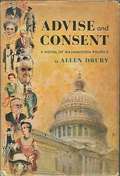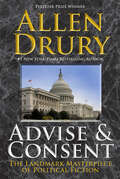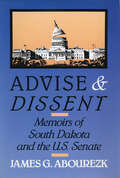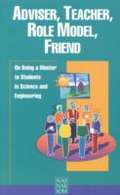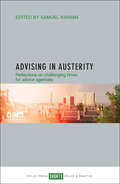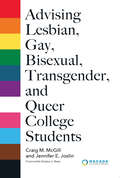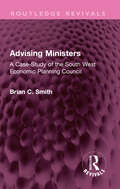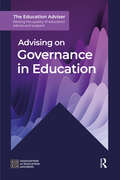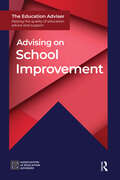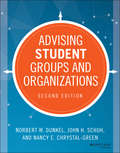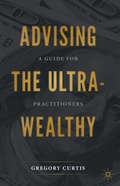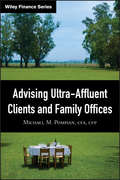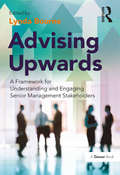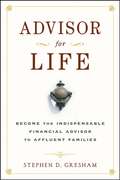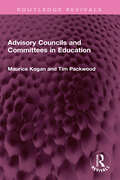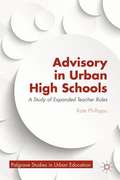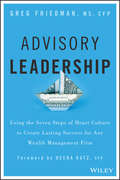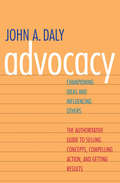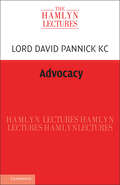- Table View
- List View
Advika Consulting Services: Challenges and Opportunities in Managing Human Capital
by Alison Wood Brooks Francesca Gino Julia J. Lee Bradley R. StaatsAdvika Consulting Services: Challenges and Opportunities in Managing Human Capital by Alison Wood Brooks, Francesca Gino, Julia J. Lee and Bradley R. Staats
Advise and Consent
by Allen DruryThe United States Senate reacts to the nomination of Robert Leffingwell, a former Communist Party member, as United States Secrety of State. <P><P> Winner of the Pulitzer Prize.
Advise & Consent: The Landmark Masterpiece of Political Fiction
by Allen DruryThe #1 New York Times bestseller and Pulitzer Prize winner. Allen Drury’s Advise and Consent is one of the high points of 20th Century literature, a seminal work of political fiction—as relevant today as when it was first published. A sweeping tale of corruption and ambition cuts across the landscape of Washington, DC, with the breadth and realism that only an astute observer and insider can convey. Allen Drury has penetrated the world’s stormiest political battleground—the smoke-filled committee rooms of the United States Senate—to reveal the bitter conflicts set in motion when the President calls upon the Senate to confirm his controversial choice for Secretary of State. This novel is a true epic showing in fascinating detail the minds and motives of the statesmen, the opportunists, the idealists. From a Senate old-timer’s wily maneuvers, a vicious demagogue’s blistering smear campaign, the ugly personal jealousies that turn a highly qualified candidate into a public spectacle, to the tragic martyrdom of a presidential aspirant who refuses to sacrifice his principles for his career—never has there been a more revealing picture of Washington’s intricate political, diplomatic, and social worlds. Advise and Consent is a timeless story with clear echoes of today’s headlines. Includes Allen Drury’s never-before-published original preface to Advise and Consent, his essay for the Hoover Institution on the writing of the book, as well as poignant personal memoirs from Drury’s heirs.
Advise & Dissent: Memoirs of South Dakota and the U.S. Senate
by James AbourezkThe life story of the founder of ADC, from his parents' farm in South Dakota to the halls of the Senate, where he refused to compromise his principles.
Adviser, Teacher, Role Model, Friend: On Being a Mentor to Students in Science and Engineering
by National Academy of Engineering Staff Institute of Medicine Staff National Academy of Sciences StaffThis guide offers helpful advice on how teachers, administrators, and career advisers in science and engineering can become better mentors to their students. It starts with the premise that a successful mentor guides students in a variety of ways: by helping them get the most from their educational experience, by introducing them to and making them comfortable with a specific disciplinary culture, and by offering assistance with the search for suitable employment. Other topics covered in the guide include career planning, time management, writing development, and responsible scientific conduct. Also included is a valuable list of bibliographical and Internet resources on mentoring and related topics. Single copy, $19.95; 2-9 copies, $17.50 each; 10 or more copies, $16.95 (no other discounts apply).
Advising Families on Estate Planning
by Lucas W. Goodman Robert C. PozenSean Warrick is an estate planning adviser at Hellwig & Macon. He is preparing for meetings with two clients. His first clients are Peggy and David Bartley, a professional married couple of moderate wealth. His second clients are Ray and Michelle Polanski, a couple that married late in life and had highly asymmetrical wealth and age. In the case, Warrick is reading a report written by Peter Sullivan, a top estate planning adviser, which considers how estate planning strategies might need to change due to recent changes in estate tax law. Specifically, Warrick must decide whether each couple should continue with their preexisting estate planning strategy, whether they should modify this strategy somewhat, or whether they should abandon their current strategy entirely.
Advising in Austerity: Reflections on Challenging Times for Advice Agencies
by Samuel KirwanAvailable Open Access under CC-BY-NC licence. In a world dominated by austerity politics and policies, Advising in austerity provides a lively and thought-provoking account of the conditions, consequences and challenges of advice work in the UK, presenting a rare and rich view of the world of advice giving. Based on original research it examines how advisors negotiate the private troubles of those who come to Citizens Advice Bureaux (CAB) and construct ways forward. Exploring how advisors are trained, the strong contributor team reflect on the challenges facing Citizens Advice Bureaux in the future, where austerity will ensure that the need for advice services increase, while funding for such services declines.
Advising in Language Learning: Dialogue, Tools and Context
by Jo Mynard Luke CarsonAdvising in Language Learning (ALL) brings together examples of advising practice and research from various international contexts in a fast-developing field. A theoretical model based on constructivism and sociocultural theory (the "Dialogue, Tools and Context Model") is proposed and supported thoughout the book, as each of the contributions focuses on one or more areas of the model. In this volume the editors set out the general aims and understandings of the field, illustrating the innovative manner in which advisors around the world are working with learners and researching the practice of ALL.
Advising Lesbian, Gay, Bisexual, Transgender, and Queer College Students
by Craig M. McGillCo-published with NACADA.Changes on college and university campuses have echoed changes in U.S. popular culture, politics, and religion since the 1970s through unprecedented visibility of LGBTQA persons and issues. In the face of hostile campus cultures, LGBTQA students rely on knowledgeable academic advisors for support, nurturance, and the resources needed to support their persistence. This edited collection offers theoretical understanding of the literature of the field, practical strategies that can be implemented at different institutions, and best practices that helps students, staff, and faculty members understand more deeply the challenges and rewards of working constructively with LGBTQA students. In addition, allies in the field of academic advising (both straight/cis-identified and queer) reflect on becoming an ally, describe obstacles and challenges they have experienced and offer advice to those seeking to deepen their commitment to ally-hood.
Advising Ministers: A Case-Study of the South West Economic Planning Council (Routledge Revivals)
by Brian C SmithFirst published in 1969, Advising Ministers is a general account of the arrangements for ‘advising Ministers’, based on a case-study, enabling the reader to judge the effectiveness of an advisory body in a particular case, which itself gained much publicity and in which hopes were high that results would be achieved. Mr. Smith’s conclusions are based on published material and informed, shrewd deduction to provide a valuable addition to the all too meagre case-study material on British administration. This book will be of interest to students of history, sociology, economics and political science.
Advising on Currency Risk at ICICI Bank
by George Chacko Vincent Dessain Marti G. Subrahmanyam Anders SjomanIn March 2003, a client approached the Markets Advisory Group at ICICI Bank, India's second largest bank, about a hedging transaction. The hedge involved multiple interest rates and currencies. Shilpa Kumar, head of the Markets Advisory Group, has to put together a recommendation for the client. She can choose from a number of financial instruments, including swaps, options, and futures contracts on interest rates and currencies, in her recommendation.
Advising on Governance in Education (The Education Adviser)
by Association of Education AdvisersAn ideal book for new or prospective education advisers which focuses on why governance is needed, what forms of governance are necessary and how these are implemented in practice. As the third instalment of The Education Adviser series, it offers essential background reading for anyone involved in advising within the education system.Divided into three sections, this book details the specifics of governance, illustrating the skills, knowledge, understanding and approaches required for governance advising. As a contributed volume, it presents a diverse range of perspectives from MAT leaders, headteachers, key influencers, and education advisers at local, regional, national and international levels. Each chapter concludes with the author's analysis of the impact and differences made, resulting in a thorough, insightful, and practical text. These case scenarios also encourage readers to reflect and consider integrating these approaches to their own practice.Chapter contents include: the importance of quality advice for school governors; regulatory frameworks across the UK jurisdictions; the principles of good governance; governance and partnerships; the role of governance in transformative change within the school setting. Readers will be fully equipped with an understanding of the role of governance in education advising and how this can enhance the educational outcomes of children, young people, and the overall effectiveness of educational settings.
Advising on School Improvement (The Education Adviser)
by Association of Education AdvisersTheoretical and practical exemplification of the education adviser's skills, knowledge and understanding in relation to school improvement.This is the second book in The Education Adviser series which fully aligns with the AoEA accreditation and focuses on school improvement, supporting the professional learning of education advisers.The education system has undergone significant change recently, giving education advisers a huge part to play, especially around school improvement. Divided into three parts – context and causality, building capacity, and collaborative school improvement – providing a thorough exploration of school improvement strategies. The range of contributions – from MAT leaders, headteachers, system leaders, key influencers and education advisers – showcases diverse perspectives and approaches and provides critically reflective opportunities.This book delves into the following topics and more: understanding a school’s improvement within a wider context, advising on curriculum, and pedagogy, supporting new head teachers in identifying priorities, building capacity to create and sustain an inclusive school culture, system-wide collaboration. Perfect for new or prospective education advisers, it will help school leaders fully understand the complexities of school improvement and how to apply this knowledge in practice.
Advising Student Groups and Organizations (Higher And Adult Education Ser.)
by John H. Schuh Nancy E. Chrystal-Green Norbert W. DunkelThe only manual for faculty and staff who work directlywith student organizations Advising Student Groups and Organizations is aone-of-a-kind book that equips faculty members and administratorsto competently and confidently serve as advisers to clubs and otherstudent groups. The second edition is here to help colleges anduniversities keep up with the skyrocketing number of student groupsand shifts in the legal landscape. New chapters on crucial topics,updated case studies, and a full suite of practical resourcessimplify the process of navigating student organizations.With Advising Student Groups and Organizations, educatorscan turn the chore of advising into a rewarding activity thatbenefits everyone. Challenges like student apathy, universitypolitics, and budgetary restrictions can be overcome with the ideasand activities presented here. And in this fully updated edition,new chapters contain everything you need to know about:Advising fraternities and sororitiesNavigating laws such as FERPA, Title IX, and the Clery ActWorking with online distance students and using social media asan advising toolConflict mediation and training student advisorsYou'll want to keep this guide handy so you can take advantageof tools like reflection questions, activities, checklists, andsample forms. Advising Student Groups and Organizations evencovers the use of assessments such as True Colors andStrengthsFinder. Now you'll be able to cut through bureaucracy tomake the student advising experience truly transformative.
Advising the Ultra-Wealthy: A Guide for Practitioners
by Gregory CurtisThis book, designed to be a guide for practitioners who wish to advise ultra-wealthy families, focuses on the difference between the ultra-wealthy and the ‘merely’ wealthy. With this in mind, the chapters devote little time to issues on which most financial advisors spend most of their time—retirement planning, IRA accounts, home mortgages, planning for college tuition, or financial planning in general. Practitioners working with the ultra-wealthy will instead need to grapple with complex tax issues, matters associated with the ever-changing world of trusts, the special world of the family office, money managers that are not available to anyone who is not an accredited investor or who enforce very high minimum account sizes, the family dynamics and human capital issues that destroy both families and wealth, and so on, all of which will be covered on a global scale in this book.
Advising Ultra-Affluent Clients and Family Offices
by Michael PompianA timely guide for financial professionals looking to tap into the lucrative world of the ultra-affluentThe ultra affluent-defined here as those having $50 million or more in liquid assets-are an elite class who expect their financial advisors to not only preserve and grow their assets, but also help them with "soft" issues such as philanthropy and family governance. One of the biggest factors to success in this field is the relationship between the client and the advisor. In Advising Ultra-Affluent Clients and Family Offices, author and practicing investment consultant Michael Pompian provides a practical introduction to who the ultra-affluent actually are and reveals what it takes to build and maintain a solid relationship with them. Filled with in-depth insights and expert advice, this unique resource offers valuable information on issues that every advisor to the ultra-affluent must be familiar with.
Advising Upwards: A Framework for Understanding and Engaging Senior Management Stakeholders
by Lynda BourneMuch has been written about leadership and team building, but there are still major gaps in thinking and research about how to engage senior stakeholders in support of an organisation's projects. The central role of stakeholders in the successful delivery of organisational strategy is becoming increasingly recognised, as is the importance of developing a sponsor culture to support more collaborative practices within the organisation. Building, and managing, relationships with senior (upwards) stakeholders is essential for success. Advising Upwards brings together the ideas of experts in fields related to engaging senior stakeholders, such as risk management, decision-making, understanding cultural considerations, effective communication and other disciplines that may enhance the sustainable engagement of senior stakeholders. The starting point is an examination of the difficulties that senior managers face as they move through the ranks of an organisation from middle management to executive levels. Senior managers usually move up through the organisation on the basis of command and control management. Once in the executive ranks they must develop a more collaborative approach and adopt the principles of emotional intelligence (EQ) to succeed. Awareness of difficulties that senior stakeholders may face drives effective approaches for communication between the team and sponsors. Case studies and stories from experts illustrate practical, structured approaches that enable the teams to develop robust relationships with senior stakeholders will result in teams 'being heard', and support their 'being extraordinary' through innovative approaches to advising upwards.
Advisor for Life
by Gresham Stephen D."The Age Wave of retiring baby boomers is creating a seismic bonanza for financial advisors--if they can provide the kinds of creative and flexible strategies their clients will be wanting and needing. Steve Gresham provides the solid, imaginative, yet practical guidance needed to build winning strategies to meet the needs of a new generation of investors. I have long respected his work and heartily recommend this book. " --Ken Dychtwald, PhD, founder and CEO, Age Wave, and author of Age Wave, Age Power,The Power Years, and Workforce Crisis "Steve Gresham showed us in The Managed Account Handbook that the basics to asuccessful advisor do not differ from one country to another. In this book, he is expanding his horizon with his extensive experiences to further help you to develop the skills for building a devoted client base. This is the must-read book for all who want to succeed in the financial advisory industry. " --Toshiya ShimizuPresident and CEO, Nikko Cordial Advisors Ltd. "For thirty years, advisors have been using wealth accumulation as their main sales weapon. With the boomers entering retirement, all that's out the window. Now the imperatives are income distribution, planning--making sure the investor does not run out of money. In Steve's newest book, he does an excellent job of walking advisors through this change and showing them how to alter their practices to not only survive but thrive. This is a must-read for any advisor who still wants to be in the business in ten years. " --Len Reinhartfounder and President, Lockwood Advisors? "For over thirty years, I have sought advice from industry experts who can help me grow and optimize my practice. Steve Gresham's advice is always of interest to me--he is always right there on the cutting edge. " --John Rafal, President, Essex Financial ServicesRegistered Rep. 's Top 50 Financial Advisor for 2006 and Barron's Top 100 Financial Advisor "A good coach can help even the best players reach their potential. As a financial advisor, you coach successful families to tackle life's challenges and achieve their goals. Steve Gresham can help--he has the tactics to help you build a winning team. " --Mike KrzyzewskiHead Coach, Duke University Basketball and the 2006 U. S. National Team
Advisory Circular AC 43.13-1B With Change 1 AC 43.13-2B
by U.S. Department of Transportation Federal Aviation AdministrationThe "bible" for AMTs, aircraft owners, and homebuilders, this FAA Advisory Circular outlines the standards for acceptable methods, techniques, and practices for the inspection, repair and alteration of non-pressurized areas of civil aircraft with a gross weight of 12,500 lbs or less. Includes both Part 1B and Part 2B. This edition contains: AC 43.13-1B Acceptable Methods, Techniques, and Practices: Aircraft Inspection and Repair, with Change 1 (effective September 2001) AC 43.13-2B Acceptable Methods, Techniques, and Practices: Aircraft Alterations (effective March 2008). Note that AC 43.13-2B can now be used as approved data.
Advisory Councils and Committees in Education (Routledge Revivals)
by Maurice Kogan Tim PackwoodFirst published in 1974, Advisory Councils and Committees in Education is an analytical account of the role of advisory councils and committees in creating and promulgating educational policies. The book reviews systematically the content of twenty-eight reports starting with the Hadow Report of 1926, in terms of developments in educational philosophy, government and administration, social policy and the economics of education. It also analyses the membership and working of the committees. The study is based on historical and organizational analysis. It is concerned not only with what the councils did but takes up the wider questions of the place of such councils and committees in educational government and their relevance for changing assumptions about other ways in which government is advised. This book will be of interest to students of education, pedagogy and public policy.
Advisory In Urban High Schools
by Kate PhillippoFar from being solely imparters of information, teachers have long been tasked with multiple and increasing responsibilities. Recent decades have now seen a formal expansion of these responsibilities, adding often-unfamiliar duties to teachers' already full plates. Advisory in Urban High Schools explores the expanded roles of teachers who serve as advisors to students, a role that often demands teachers provide social-emotional support to their advisees. Through an in-depth study of teachers in multiple small, urban high schools with advisory programs, this book considers the precedents for the advisor's role; the interpretations, enactments, and responses teachers bring to the advisor's role; and the experiences of and outcomes for students.
Advisory Leadership: Using the Seven Steps of Heart Culture to Create Lasting Success for Any Wealth Management Firm
by Deena B. Katz Greg FriedmanThrive in a changing industry by putting your people first Advisory Leadership is a practical and highly executable guide for financial advisors and finance professionals looking to thrive in today's changing financial services industry. Written by a leading financial advisor with practice improvement expertise, this book shows you how to master the art of leadership while remaining agile and adaptable. You'll learn the seven steps you must take to keep pace and thrive amidst the industry's evolution, with clearly articulated explanations and motivational action items. The discussion covers patience, integrity, compassion, respect, consistency, encouragement, and courage--the foundations of success and continued growth--and shows you how to practice what you preach with real strategies for living the vision and being a true leader. The financial services industry is at a crossroads, between a generation on the cusp of retirement and the new generation stepping in to take its place. This transition has been called a crisis of culture, of values, and of communication, but it's really an opportunity. This book faces the changes head-on, and delivers practical solutions that start and end with your greatest resource--your people. Unlock the secrets to a people-first company Speak openly, walk the walk, and promote personal growth Reward firm-wide collaboration and a team mentality Reshape your company's DNA to thrive in today's financial environment The industry's overarching question is one of differentiation: how can your firm stand out amid the rise of robo-solutions and an unpredictable future? Advisory Leadership shows you how a people-focused company culture can elevate a firm from surviving to thriving.
The Advisory Roles of Political Scientists in Europe: Comparing Engagements in Policy Advisory Systems
by Marleen Brans Arco TimmermansThis open access book centres on the advisory roles of political scientists in Europe. Based on a cross-national survey, the book offers a comparative analysis of the viewpoints and activities of university-based political scientists on external engagement. Political scientists in Europe appear more extrovert as academics than sometimes thought. In their professional functioning they engage in delivering knowledge and advice to all kinds of stakeholders in the policy process. This volume contains twelve in-depth country studies where different trends are visible, from political regime change to pressure for impact of academic work. The findings from this comparative analysis may inform our orientation on interaction between academics and their social and political environment, and what this means for education and training in university programs in political science.
Advocacy
by John DalyWhen a group of people gather together to generate ideas for solving a problem or achieving a goal, sometimes the best ideas are passed over. Worse, a problematic suggestion with far less likelihood of success may be selected instead. Why would a group dismiss an option that would be more effective? Leadership and communications expert John Daly has a straightforward answer: it wasn't sold to them as well. If the best idea is yours, how can you increase the chances that it gains the support of the group? In Advocacy: Championing Ideas and Influencing Others, Daly explains in full detail how to transform ideas into practice. To be successful, leaders in every type of organization must find practical and action-oriented ways to market their ideas and achieve buy-in from the members of the group. Daly offers a comprehensive action guide that explains how to shape opinion, inspire action, and achieve results. Drawing on current research in the fields of persuasion, power relations, and behavior change, he discusses the complex factors involved in selling an idea--the context of the communication, the type of message being promoted, the nature and interests of the audience, the emotional tenor of the issues at stake, and much more. For the businessperson, politician, or any other member of a group who seeks the satisfaction of having his or her own idea take shape and become reality, this book is an essential guide.
Advocacy
by David Kc PannickLord Pannick celebrates advocacy: that controversial legal issues are decided in court after reasoned argument in which the participants refrain (usually) from shouting, personal insults or threats, and the points on each side of the debate are tested for their relevance, their accuracy, and their strength. The book seeks to identify the central characteristics of good and bad advocacy with the aid of examples from courtrooms in the UK and abroad. Lord Pannick also examines the morality of advocacy - that the advocate sets out views to which he does not necessarily subscribe, on behalf of clients for whom she may feel admiration, indifference, or contempt. Lord Pannick seeks to answer the question he is often asked - more by friends than by judges - 'How can you act for such terrible people?'. Finally, he addresses the future of advocacy, arguing it should and will survive pressures for efficiency and technological developments.

